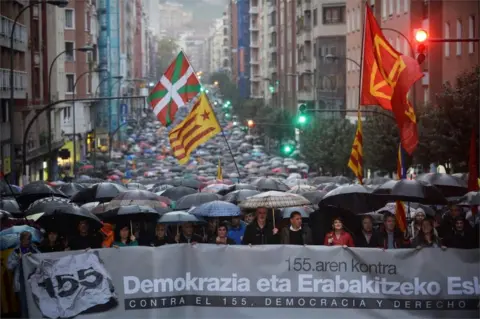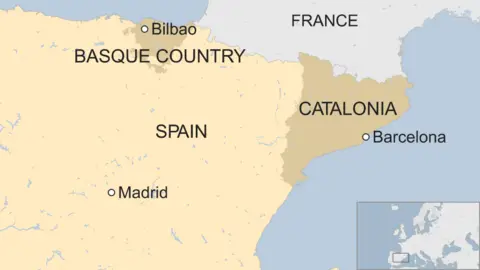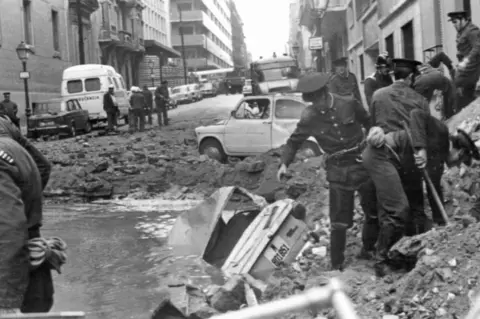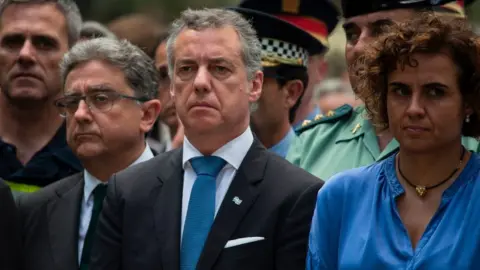Catalonia crisis: Why Basque leaders worry about Spain chaos
 Reuters
ReutersThe Basque Country, where Eta separatists used violence in a campaign for independence from Spain, is in a predicament over Catalonia's standoff with Madrid.
The government of the Basque Country has to offer support for Catalonia's right to decide its own future. Both regions have a large degree of self-rule, their own language and cultural traditions. And both have a history of being distinct, if not truly independent, regions within larger kingdoms.
But the current Basque leadership does not want rebellious acts to put in jeopardy the progress it has been making towards self-rule.
So how have the Basque leaders responded to the Catalan crisis?
'Lessons learned'
Led by the moderate Iñigo Urkullu, the Basque regional government has offered polite support for Catalonia's aspirations, while also expressing alarm at the divisive situation that has developed since the region held a referendum on 1 October. Mr Urkullu has said the referendum cannot be considered legal or binding.
His Basque Nationalist Party (PNV) is "above all a law and order party," says Borja Lasheras, director of the European Council of Foreign Relations think tank in Madrid.
"They don't like the chaos we are seeing in Catalonia."

Born in the Basque Country himself, Mr Lasheras puts the region's cautious approach down to the deep scars from the militant group Eta's bid for an independent Basque homeland - which saw more than 800 people killed over a 45-year-period until the organisation announced a permanent ceasefire in 2011.
"We have come out of a dark period, which saw Basque society fractured," he says.
"The lesson learned is that it doesn't make sense to push for independence because it galvanises your opposition."
 AFP
AFPMr Lasheras says the Basques have "nothing to envy the Catalans".
Indeed the northern region has a better self-rule deal than Catalonia. Unlike Catalans, Basques do not pay more in taxes than is spent on their region - a rule that is enshrined in law.
Essential ally
Previous Basque leaders have pushed for greater freedoms.
Juan José Ibarretxe, also of the PNV, pushed for a referendum on self-determination in the early years of the current century. But his plan hit the brick wall built into Spain's constitution, which describes the nation as "indivisible". The Spanish Congress rejected his proposals in 2005 and Basque laws laying the framework for a binding vote were shot down by Spain's constitutional court.
Since that time, Eta has declared a definitive end to its violent campaign and there is more concern about socioeconomic problems than political symbolism.
Today, Mr Urkullu has developed a working relationship with Spain's central government, achieving improvements in the Basque region's financial package and degree of self-rule.
 Getty Images
Getty ImagesMr Urkullu, as veteran Basque journalist Luis Aizpeolea put it, "knows that Basque society has had enough of adventures".
In Spain's hung parliament, the PNV is an essential ally of Prime Minister Mariano Rajoy's Popular Party, which needs the Basques' support to pass key legislation, in particular Spain's budget for 2018.

Support for independence
In the Basque Country:
- According to recent surveys, support among Basques for independence has fallen in recent years. A 2017 study by the University of Deusto found 17% of Basques back independence from Spain, with 29% happy with the current level of self-rule and 38% in favour of further boosting autonomy
In Catalonia:
- Catalonia's authorities claim that 90% of the 2.3 million votes they were able to count after the controversial October referendum were in favour of seceding from Spain. Turnout was said to be 43%. This means that around 38% of the total electorate voted for independence, consistent with some surveys in recent years
- In the 2015 elections to Catalonia's parliament, pro-independence parties won 48%, enough for a majority in the house

But the Basque leader also has pressure at home from overtly pro-independence forces, such as Bildu, which won 21% in the 2016 regional elections to the PNV's winning 38%.
It is a fine balance.
Negotiations
The Basque leader has criticised Mr Rajoy's government for playing politics through the courts after last week's decision by a Madrid judge to remand in custody eight former members of Catalonia's deposed government without bail.
"It's the worst decision that could have been taken," Mr Urkullu said. "It shows a complete lack of political intelligence".
The 'lehendakari', as Basque premiers are known, was involved in 11th-hour negotiations to prevent his Catalan counterpart, Carles Puigdemont, from going ahead with a unilateral declaration of independence in Catalonia's parliament.
Mr Urkullu made an ultimately unsuccessful bid to convince Mr Puigdemont to take a step back from the precipice and call regional elections.
What now?
The fact that the Catalan leader has kept on going is a problem for Mr Urkullu.
Seen as the quiet but effective man on Spain's political scene, his attempt to broker a truce between Madrid and Barcelona has been seen to fail.
And while the Spanish state continues its crackdown on Catalan separatism by locking up its political leaders, it will be hard for Mr Urkullu to follow his inside track towards a better self-rule package by helping the Rajoy government pass legislation.
But the 'lehendakari' will not panic. The PNV's position as the party of government with deep ties to the business community, as well as its cultural kudos built up over more than a century of leading the Basque cause, make it a steady ship even in a heavy storm.
"The PNV is a curious balance," says Mr Lasheras.
"It has two souls - one is almost cynically pragmatic, the other a reforming spirit in search of greater self-government."
